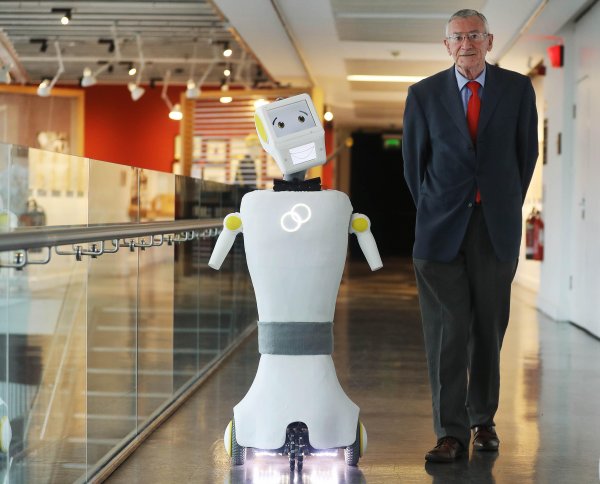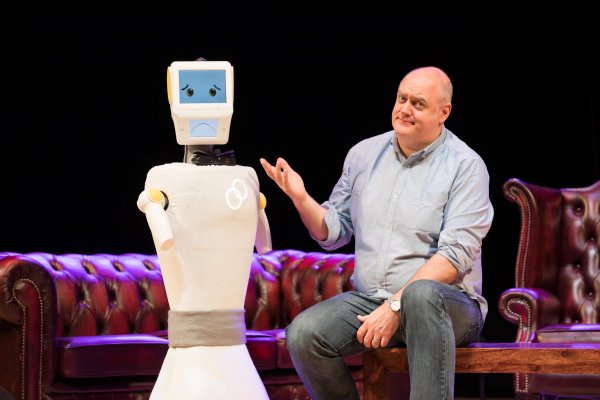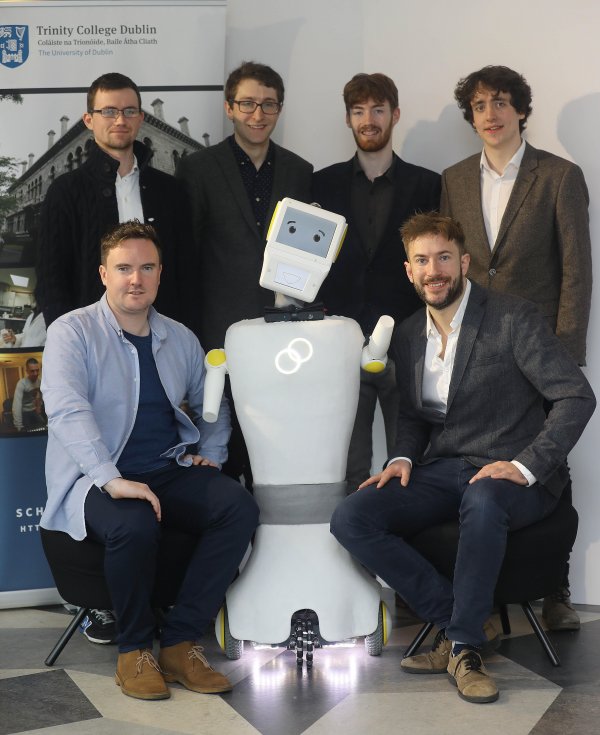Espositori 2018
- HOME AUTOMATION
- ROBOTICS
- YOUNG MAKERS (< 18)
- OPEN SOURCE
- 3D PRINTING
- DRONES
- EDUCATION
- FABRICATION
- HACKS
- NEW MANUFACTURING
- SCIENCE
- ENERGY & SUSTAINABILITY
- ART
- INTERNET OF THINGS
- MUSIC & SOUND
- RECYCLING & UPCYCLING
- KIDS & EDUCATION
- ARTISANS & NEW CRAFT
- CULTURAL HERITAGE
- GAMES
- WELLNESS & HEALTHCARE
- FASHION & WEARABLES
- FOOD & AGRICULTURE
- BIOLOGY
- 3D SCANNING
- AEROSPACE
- STEAM PUNK
- ARTIFICIAL INTELLIGENCE
- ARDUINO
- CROWDFUNDING
Stevie, the assistive robot
Stevie is a socially assistive robot that was developed at the Robotics and Innovation lab in Trinity College Dublin, Ireland. The design was heavily motivated by the need to develop robots that could perform tasks that could empower users that faced challenges maintaining their independence, such as older adults and people living with disabilities.
Its head comprises two digital displays that allow it to convey emotions and socially interact with users. This design also allows it to have Skype calls and to use the displays to facilitate games. It had two small arms, which can be used to emphasise emotions, show attention, and gesture. The robot is equipped with a range of sensors including a depth sensor, LIDAR, and 360 degree camera. The team are currently in the process of planning for a field pilot and are also developing a new version of the robot, to be unveiled in early 2019.
Its head comprises two digital displays that allow it to convey emotions and socially interact with users. This design also allows it to have Skype calls and to use the displays to facilitate games. It had two small arms, which can be used to emphasise emotions, show attention, and gesture. The robot is equipped with a range of sensors including a depth sensor, LIDAR, and 360 degree camera. The team are currently in the process of planning for a field pilot and are also developing a new version of the robot, to be unveiled in early 2019.
Ireland
Robotics And Innovation Lab (Trinity College Dublin)
Dr. Conor McGinn is an Assistant Professor and co-founder of the Robotics And Innovation Lab (RAIL) in Trinity College Dublin. In 2015, Dr. McGinn was awarded a PhD in robotics, also from Trinity College Dublin. Dr. McGinn’s primary expertise is in the design and control of service robots. He holds several patents related to the design of robots, and has been shortlisted for several design awards, most notably winning a national award for Engineering innovation in 2013. Dr. McGinn is a senior member of the SUGAR Design network, and is a member of several development committees for standards concerning service robots.
Eamonn Bourke is a research assistant in the field of robotics in Trinity College Dublin. He has graduated from Trinity with a Bachelors and Masters degree in Mechanical and Manufacturing Engineering. He is currently focused on the commercialisation of a mobile service robot platform, and with other areas including standardisation certification and engineering design.
Adam Coyne is a PhD in the field of robotics in Trinity College Dublin. He has graduated from the University of Umea, Sweden with a Masters degree in Robotics and Control. Prior to this, he completed Bachelors degrees in Physics and Chemistry, and Computer Science from Université de La Rochelle, France. His PhD research is focused on the multi-modal tele-operation of social robots.
Michael F. Cullinan is pursuing a doctoral degree in Trinity College Dublin. He has previously been awarded Bachelors and Masters degrees in Mechanical and Manufacturing Engineering from the same institution. His main research areas include compliant actuation, pneumatic actuators, domestic service robotics and engineering design.
Cian Donovan is an undergraduate student and research intern at Trinity College Dublin. He has a keen interest in electronics, power management, security, software development, and artificial intelligence.
Niamh Donnelly is research intern at Trinity College Dublin. She has recently completed a Masters degree in Artificial Intelligence and Machine Learning from University College Dublin. She also holds a Bachelors degree in Mechanical Engineering from Dublin City University. She has a keen interest in sensing, machine learning, machine vision and data science.
Eamonn Bourke is a research assistant in the field of robotics in Trinity College Dublin. He has graduated from Trinity with a Bachelors and Masters degree in Mechanical and Manufacturing Engineering. He is currently focused on the commercialisation of a mobile service robot platform, and with other areas including standardisation certification and engineering design.
Adam Coyne is a PhD in the field of robotics in Trinity College Dublin. He has graduated from the University of Umea, Sweden with a Masters degree in Robotics and Control. Prior to this, he completed Bachelors degrees in Physics and Chemistry, and Computer Science from Université de La Rochelle, France. His PhD research is focused on the multi-modal tele-operation of social robots.
Michael F. Cullinan is pursuing a doctoral degree in Trinity College Dublin. He has previously been awarded Bachelors and Masters degrees in Mechanical and Manufacturing Engineering from the same institution. His main research areas include compliant actuation, pneumatic actuators, domestic service robotics and engineering design.
Cian Donovan is an undergraduate student and research intern at Trinity College Dublin. He has a keen interest in electronics, power management, security, software development, and artificial intelligence.
Niamh Donnelly is research intern at Trinity College Dublin. She has recently completed a Masters degree in Artificial Intelligence and Machine Learning from University College Dublin. She also holds a Bachelors degree in Mechanical Engineering from Dublin City University. She has a keen interest in sensing, machine learning, machine vision and data science.
H39 (pav. 5)





















































































